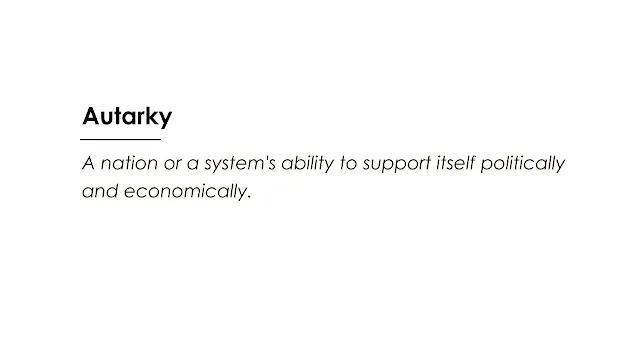 |
| Image: Moneybestpal.com |
The concept of autarky describes a nation or a system's ability to support itself politically and economically.
It implies that the entity relies on its own resources and capacities rather than on foreign trade, aid, or influence. Since autarky seeks to minimize or do away with the need for imports and outside intervention, it can be seen of as an extreme kind of protectionism or nationalism.
The word autarky, which means self-sufficiency, is derived from the Greek words autos (oneself) and arkein (to meet one's needs). Throughout history, several ideologies and movements have used the concept of autarky, including left-wing populism, swadeshi, communalism, war communism, and African socialism.
These groups frequently supported autarky as a strategy for developing alternative economic systems or for battling the hegemony of foreign powers or systems.
Autarky has, however, also been advocated by conservative, centrist, and nationalist movements, typically on a smaller scale, in order to grow a particular industry, win independence from neighboring countries, or preserve a portion of an existing social order.
To achieve self-sufficiency in food, energy, and raw materials as well as to get ready for war, Nazi Germany, for instance, adopted an autarky strategy in the 1930s and 1940s. Another example is North Korea, which has isolated itself from the outside world and relied solely on its own resources and ideology since adopting an autarky strategy in the 1950s.
The primary argument in favor of autarky is that it can increase national security and sovereignty by decreasing reliance on outside sources of influence and supply. Autarky can also be considered as a strategy to shield domestic businesses and workers from unfair overseas competition and exploitation.
Autarky can also be inspired by moral or environmental considerations, such as avoiding the harmful effects of globalization or encouraging local production and consumption.
Autarky does, however, have a lot of problems and limitations. First of all, autarky is exceedingly challenging to attain in reality, particularly in the contemporary day where the global supply chain is intricate and interwoven.
No nation is capable of meeting all of its requirements or desires on its own, and even the most remote nations engage in some degree of trade with other nations and occasionally accept assistance from them. Second, autarky can hinder the advantages of specialization, comparative advantage, economies of scale, and innovation that result from trade and cooperation, which can have a detrimental impact on economic growth and well-being.
For both customers and producers, autarky can result in higher costs, inferior quality, and a smaller selection of goods and services. Thirdly, because it can exacerbate tensions and conflicts with other nations or groups who have different interests or beliefs, autarky can be detrimental to political and social stability. Autarky can also promote nationalism, authoritarianism, and isolationism within the nation or system that practices it.
Autarky is therefore neither a desirable or realistic objective for the majority of nations or systems in the modern world. Most nations aim to balance their trade connections with other nations based on their comparative advantages, geopolitical objectives, and mutual benefits rather than aiming total self-sufficiency.
Tariffs, quotas, subsidies, and other measures can control trade to shield particular industries or groups from unjust competition or outside shocks, but not to the point where it compromises the economy's general efficiency and welfare. Aid, collaboration, or integration with other nations or areas can be used in addition to trade to address shared issues or opportunities that call for coordinated action.
